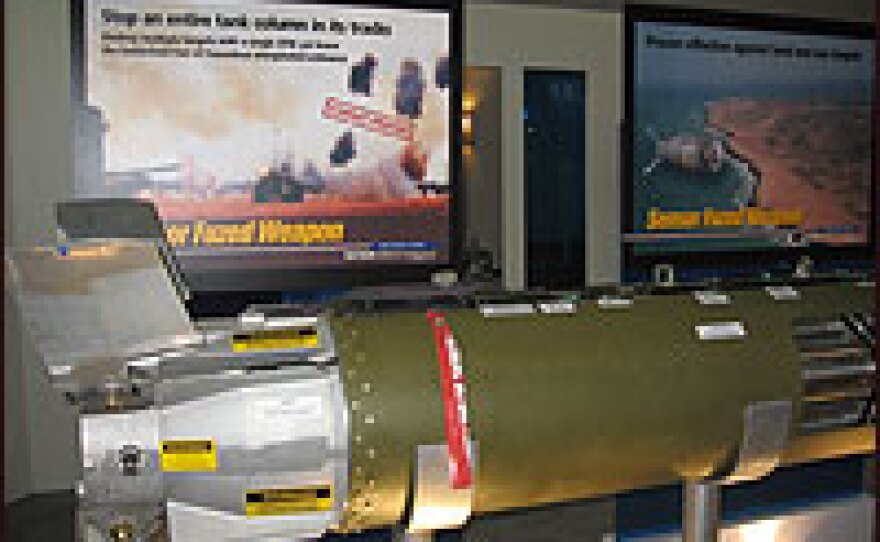
This week, the Persian Gulf sheikhdom of Dubai held its annual air show, a time when airplane manufacturers flock to lucrative markets in the Middle East. NPR's Ivan Watson visited the aviation industry event, and sent this reporter's notebook.
The flashiest parts of the air show were the stunt planes, which performed aerial acrobatics and drew a heart with an arrow through it with their smoke trails.
Surprisingly, though, most of the attention seemed to be focused on a commercial passenger plane, the new double-decker Airbus A380. It is manufactured in Europe and can seat more then 850 passengers.
Crowds gathered on the tarmac to snap photos as the A380 flew fat, lazy circles overhead.
A French woman clapped and murmured with reverence, "Europe."
A Saudi billionaire prince chose a different way to express his enthusiasm. Prince Alwaleed Bin Talal, the world's 13th-wealthiest man, bought a $300 million A380 for himself. Newspapers dubbed it his flying palace.
Envious, I asked Gary Scott, an executive at the Canadian airplane manufacturer Bombardier, to give me a tour of his company's much smaller private jets.
"This is a best-seller," Scott said, as he took me aboard a Challenger 300. A bottle of champagne waited in a silver bucket on a table next to the plane's eight leather passenger seats. The plane costs $20 million, and even then, Scott said there's a 3-year waiting list to buy a new one.
According to Scott, customers tend to be corporations and "high net-worth individuals, who can afford to travel in this kind of comfort and usually have schedule demands and other commitments where they need to be able to move in and out of locations quickly."
Places, he later explained, like Vail, Colo.
Until recently, the business aircraft market has been dominated by North America and Europe.
"But now it's beginning to explode in places like Russia, the Middle East, and Asia," Scott said. "If you look at the Middle East or any of the oil-producing regions, the principals are capitalizing on $100 a barrel and you bet that drives the market demand for business aircraft." [Crude oil prices have hovered this month at record prices topping $90 a barrel.]
The most jarring thing about the air show was seeing luxury jets marketed to the filthy rich, just a few yards away from arms manufacturers selling missile systems and smart bombs.
In the convention hall, Textron Systems displayed a squat, green metal cylinder called a "Sensor Fuzed Weapon," or SFW. Textron claimed the bomb destroyed an entire Iraqi tank column during the U.S. invasion of Iraq.
"Combat proven," a label announced in bright red letters. A promotional video that looked an awful lot like a video game showed how a parachute enabled the SFW to distribute countless "smart skeet warheads" which destroyed a lot of Iraqi tanks.
A narrator, backed by the sound of explosions and martial music, announced that "the surprise and devastation incurred by a single SFW pass, obviated the situation. The remaining Iraqis abandoned the site. What could have been was reduced to a few minutes of high pucker factor and a couple of radio calls."
To be fair, most of the Dubai Air Sow focused on the commercial airline business. Middle Eastern countries set new records, when they announced purchases of entire fleets of hundreds of new commercial passenger planes, to the tune of an estimated $80 billion.
I bet the arms dealers did pretty well here too.
Copyright 2022 NPR. To see more, visit https://www.npr.org. 9(MDAzMjM2NDYzMDEyMzc1Njk5NjAxNzY3OQ001))







